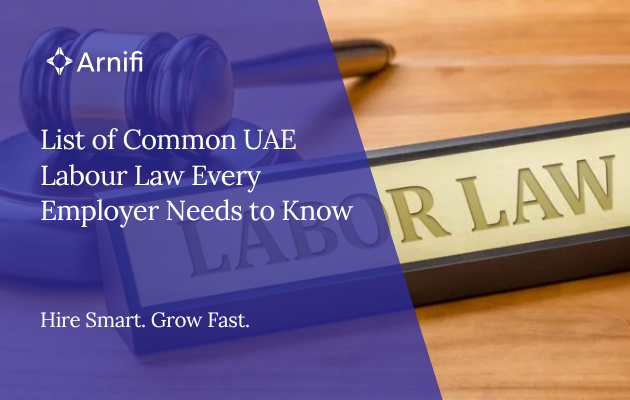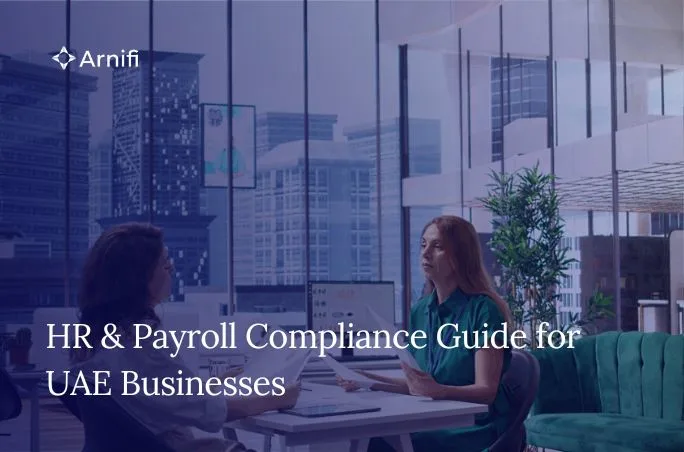List of Common UAE Labour Law Every Employer Needs to Know
by
Shethana
May 13, 2025  7 MIN READ
7 MIN READ

Understanding the UAE labour law is essential for any employer doing business in the United Arab Emirates. These laws create the legal framework and set the norms to which employer-employee relationships must abide to ensure fair treatment, accountability, and protection for both parties. Whether hiring the first employee or managing a big workforce, the laws ensure fewer legal disputes, greater employee satisfaction, and a more viable business environment.
Table of contents
Introduction
The UAE labour law is established and regulated by the Ministry of Human Resources and Emiratisation (MOHRE). The law is applicable to all private sector employers throughout the seven emirates. The public sector, meanwhile, is governed by separate HR regulations, although the federal labour law defines the minimum standards relating to the terms of employment, contract matters, wages, leave entitlements, and termination procedures in the private sector.
With the most recent amendments and enactments of Federal Decree Law No. 33 of 2021, the UAE labour procedures have been refined to enable them to better accommodate a fast-paced, ever-evolving population so as to attract international talent. Staying abreast of the laws and regulations is merely a legal obligation for the employer; indeed, it is an intelligent step in retaining strong personnel and able to keep your company in compliance.
Employment Contracts
Employment contracts serve as the foundation upon which working relationships are built and must be formulated in accordance with UAE labour law. The types of labour contracts can be classified into:
- Full-time contracts
- Part-time, temporary, or flexible contracts (brought into existence through the latest amendments)
When hiring people under an employment relationship, the employer must issue a written job contract that details the work to be performed, pay, benefits, working hours, and conditions for terminating the contract.
Private Sector vs Public Sector Employment
Private sector workers are subject to MOHRE and, therefore, regulated by the UAE labour law. Public sector employees follow a different set of rules under Federal Decree Law No. 49 of 2022 on human resources. For an employer, awareness of this distinction is very important, particularly if your organisation interfaces with government entities or hires from both sectors.
Probation Period
Employers, under the UAE labour law, may place new hires on a probationary period of up to 6 months. Termination is possible within this period without the requirement of giving a notice period, except that a written notice of at least fourteen days must be given to the employee. If the employee intends to resign during probation from the current employer to join another employer in the UAE, he must give a one-month notice period; and if he is exiting the country, fourteen days’ notice must be given.
Leaves and Holidays
In accordance with the labour laws, several types of leave are to be given to employees in the UAE. They are as follows:
- Annual Leave: Employees are entitled to 30 calendar days of paid leave every year upon completion of 1 year of employment. For periods less than a year but greater than 6 months, leave is granted on a pro-rata basis.
- Sick Leave: Employees who have completed the 3-month probation period shall be entitled to a sick leave amounting to 90 days per year, the conditions of which are:
- Full pay for the first 15 days
- Half pay for the next 30 days
- Unpaid for the remaining 45 days
- Maternity Leave: Female employees are entitled to 60 days of maternity leave, of which 45 days will be fully paid, while the remaining 15 days will be half paid.
- Paternity Leave: 5 days of paid paternity leave, not later than 6 months following the birth of the child, shall be allowed to fathers.
- Bereavement Leave: 3 to 5 days of paid leave shall be granted to employees, dependent on family relationship.
- Hajj Leave: This refers to an unpaid leave of no more than 30 days granted once during the whole period of employment for performing the pilgrimage to Mecca.
- Public Holidays: Public holidays in the UAE are declared by the government and include such holidays as Eid, National Day, and Islamic New Year. These are paid holidays; however, the dates slightly vary from year to year.
Working Hours & Wages
Work Hours
According to the UAE labour law, the standard workday may consist of 8 hours of work or a maximum of 48 hours weekly for private sector employees. However, two hours of working time are deducted during Ramadan.
For some businesses, say heavy industries in which heavy manual labour is involved, working hours may be further reduced. Any overtime work shall be paid not less than 125% of the hourly rate, while late night work on Saturdays shall be paid at the 150% rate.
Generally, and in the public sector, there are varying working schedules; most usually observe fewer working hours and more holidays.
Salary
Wages Protection System (WPS) monitors payments to ensure they are punctual and traceable. Employers must pay salaries through the system, which is generally done on a monthly basis. If there are any delays or discrepancies, fines are imposed on the employer, and the company is deemed unfit to work with foreign entities for some time.
Currently, the UAE does not have a national minimum wage. However, an employer needs to pay compensation as stated in the terms and conditions of employment, i.e. payment must be based on contract standards and local market rates.
The UAE labour law covers matters of paid and unpaid leave, gratuity payments, and compensation for work injuries or accidents, which remain fair matters to be dealt with by an employer.
Employee Benefits
Health Insurance
It is a compulsory benefit for all employees in the UAE. In Dubai and Abu Dhabi, the employer must legally provide health coverage for their employees (and their dependents in Abu Dhabi).
Such insurance must, at the very least, cover general health care services like:
- General medical checkups
- Emergency services
- Prescription drugs
- Maternity care
Employers should ensure that their insurance provider meets any obligations imposed by the local health authorities, such as the Dubai Health Authority (DHA) or the Department of Health Abu Dhabi (DOH).
Other Benefits
Employees oftentimes receive various additional benefits such as:
- End of service benefits
- Travel allowances
- Performance bonuses
- Education funding for children (especially in top-tier companies)
Offering good benefits can help businesses attract and retain talent, especially when there is abundant expatriate talent in the market.
Termination of Employment
Termination Policy
According to UAE labour law, both employers and employees have the right to terminate an employment contract so long as proper notice is given (from 30-90 days according to the contract). End-of-service benefits shall be calculated and paid out, and all legally required clearances for final settlements shall be arranged.
If such dismissal is without cause, it may lead to compensation. Thus, the cause and manner of termination shall be according to the law.
Disciplinary Rules
Employers may impose discipline by way of punishment, including:
- Written warnings
- Suspension with pay
- Salary deductions
- Dismissing the employee (with or without notice relative to the seriousness of the act)
However, procedures should follow due process, such as documentation and formal notice. Violation of good faith could result in a dispute and compensation claims.
Conclusion
The UAE labour law provides a strong framework within which both employer and employee rights shall be protected. For any employer, understanding and implementing these laws in their organisation, covering employment contracts, working hours, and termination procedures to benefits, is essential. A little bit of legal compliance will bring about a conducive working atmosphere and positive vibes for all.
Keeping abreast and being proactive with labour laws will ensure your company’s long-term success in the UAE. Review HR policy regularly, draft or update contracts in accordance with
Check What Arnifi’s HR Solutions Offer
Arnifi HR solutions ease the hiring process in the UAE as everything fully complies with labour laws, visas, WPS, and insurance, thereby eliminating legal risks. No local entity setup is required, which means some time and cost savings. Quick and efficient onboarding means your team can begin work within a matter of days.
From basic to premium, our flexible plans cater to the needs and budgets of different businesses. And with the fully transparent pricing, you’ll never have to worry about hidden fees. For hassle-free, compliant, efficient, and affordable hiring in the UAE, look no further than Arnifi HR. For better understanding, get a free consultation now!
Top UAE Packages

Related Articles
Top UAE Packages



